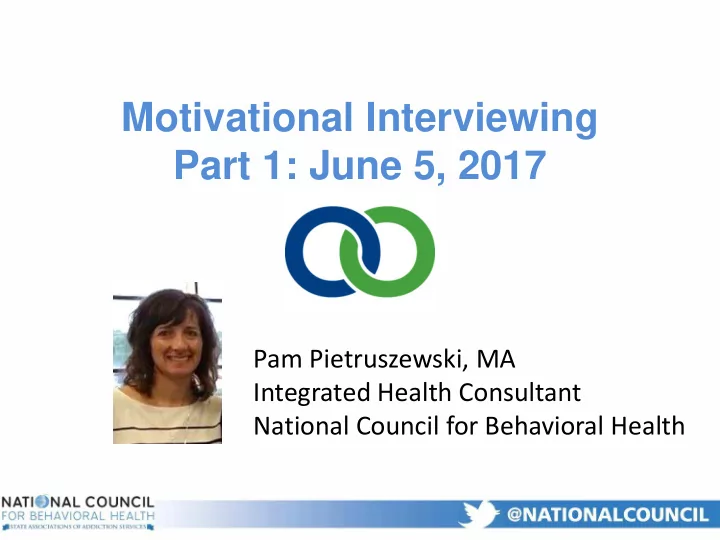

Motivational Interviewing Part 1: June 5, 2017 Pam Pietruszewski, MA Integrated Health Consultant National Council for Behavioral Health
Housekeeping GoToWebinar INSTRUCTIONS: Join the webinar: How to join https://attendee.gotowebinar.com/register/107 the webinar? 4586077905203715 Call in using your telephone: +1 (415) 655-0052 Access Code: 453-797-517 Audio PIN: Shown after joining the meeting To ask a question: Enter your unique Audio PIN so we can mute/unmute your line when necessary OR type it into the Q&A pod. Technical difficulties? Call Citrix Tech Support at 888-585-9008
Polling question #1 My experience with Motivational Interviewing: a. None b. I’ve had training in the past, but using it is not top of mind c. I use it some d. I use it every day
Polling question #2 My own motivation level: a. Is always rock bottom low b. Goes up and down depending on the day, circumstances, etc. c. Is always sky high!
Prochaska & DiClemente 1983
Motivational interviewing is a collaborative, person-centered, guiding method designed to elicit and strengthen motivation for change. Miller & Rollnick, 2012
Social Determinants of Health Environment 5% Medical qual Behavioral issues & avail 10% represents the greatest single Behavior Social domain of influence 40% circumstances on health in the U.S. population.” 15% McGinnis 2002 Genetics 30%
MI is not…. • A way of tricking people into doing what you want them to do • A specific technique • Problem solving or skill building • Easy to apply • A remedy for every clinical challenge Miller & Rollnick, 2009
What do we know with reasonable confidence about MI? • MI improves treatment retention, adherence, and outcomes across a range of behaviors • Outcomes vary widely across providers, programs, and research sites • MI skill is reliably measurable and predicts better outcomes • MI generalizes fairly well across cultures • Therapeutic relationship matters
4 Fundamental Processes Engaging Focusing Evoking Planning
The Spirit Partnership of MI Evocation Acceptance Compassion
The Spirit Partnership of MI Evocation Acceptance Compassion
The Spirit Partnership of MI Evocation Acceptance Compassion
Polling question #3 Client: I know I need to get my life back on track but I’m so overwhelmed right now. What do you think I should do? Clinician: I have some ideas, but first help me understand – what have you already considered? Does this clinician’s response embrace the MI “spirit”? a. Yes b. No c. Somewhat
Polling question #4 Patient: The doctor just told me I have to quit smoking and lose 40 pounds or I could die. I’m tired of her scare tactics. It’s my life. Clinician: We all want what’s best for you. Should we talk about smoking reduction or weight loss strategies first? Does this clinician’s response embrace the MI “spirit”? a. Yes b. No c. Somewhat
OARS: Listening Style that Motivates Change • Open-Ended Inquiry • Affirmations • Reflections • Summaries
Open-Ended Inquiry • Understanding the other’s experience • Ask for examples & elaboration • How…What…Tell me…
Closed to Open Instead of Try 1. Are you still checking How do you check your blood your blood sugar? sugar? 2. Why aren’t you Tell me more about the treatment following the treatment plan and how it looks for you day plan? to day. 3. Will you go to the support group? 4. Don’t you want to see your grandkids grow up?
Affirmations • Supportive, testaments of character • Genuine, direct reinforcements • Demonstrate understanding
Attributes of Successful Changers Accepting Determined Patient Adaptable Eager Persistent Alert Faithful Reasonable Ambitious Flexible Reliable Focused Steady Assertive Forgiving Strong Brave Hopeful Thorough Careful Ingenious Trusting Committed Mature Truthful Considerate Open Willing Creative
Reflections • What you hear, what you observe • Succinct • Not problem solving or advice. • Right now. Not the future.
“It’s hard being the new kid in school! I don’t always plan to get high but sometimes it’s too much work to come up with an excuse.” It’s hard being the new kid. You’re don’t always want to smoke pot. You want to find easier ways to fit in.
I’ve been coming to this clinic for 10 years, ever since I found out I have diabetes. When the panic attacks started a few months ago, I didn’t think I could handle another health problem. I’m still seeing the therapist but I don’t know if it’s helping. I’m overwhelmed and just want to get back in control. How would you use your OARS? Type what you might ask or say next in the chat box!
Summarizing • Helps if conversation is stuck or unproductive • Validating • Collect, link, transition
Example Summary 1. Let me see if I’ve got what we’ve talked about so far. 2. You want these problems to go away. You don’t think counseling has been helpful and you want to find another solution. 3. Where does this leave you?
Questions & Comments
Next Webinar: Webinar #3: Evidence Based Practices for IBH: Applying Motivational Interviewing (part two) June 19 th 2-3pm MT (4-5pm ET)
Thank you!
Recommend
More recommend